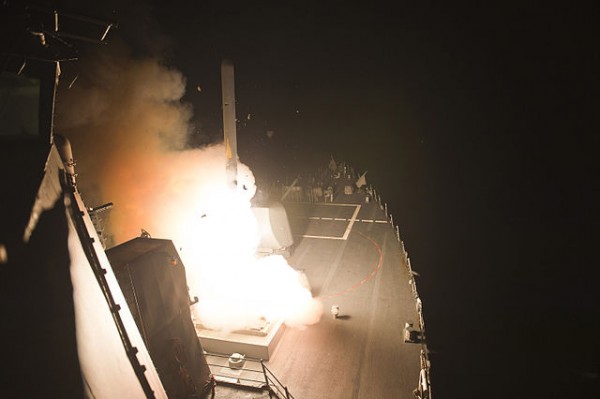
Photo Credit: U.S. Navy photo by Mass Communication Specialist 2nd Class Carlos M. Vazquez
In the wake of the Paris shootings, Joseph Lieberman and Newt Gingrich voiced a call for war against Islamist radicalism. Gingrich seeks a finding akin to George Kennan’s 1946 analysis of the Soviet threat, while Lieberman would deploy our values to defeat this adversary. These are among the unfiltered reactions that show our public discourse whiplashed, by horrible events, to voice bad ideas. To weaponize our values to fight the Islamist threat would confuse ends with means. To ascribe the Soviets’ Cold War centrality to Islamism would neglect other threats and the larger threat they pose together.
Our discourse needs a stronger internal compass.
The U.S. is defined by its founding, and to validate those principles is our fundamental national interest. We are by nature the “champion” of those “modern values,” as Garry Kasparov labels them, and a target for any who reject free society. But defeating enemies is not our purpose. Validating freedom is a positive end, not definable by opposition to any foe.
Our adversaries are defined by their antipathy to us. Globalization, in Kasparov’s words, has led “the 21st century [to collide] with cultures and regimes intent on existing as in centuries past.” The regimes, political or religious, claim legitimacy by meeting age-old needs for security in a hostile world, for religious, tribal or ethnic identity groups. They rally their followers around “true belief” and solidarity. What they share with these followers is neither oppression nor poverty, as noted by Martin Wolf, but frustration. They feel “out of place,” whether living in Western societies or in the shadow of a global culture they see imposed by Western power and money.
Our enemies have devised “glamorous” images to recruit alienated young men. Our campaigns against them feeds this appeal; they all resent modernity’s outcomes. But recruiters offer only incendiary icons of their particular identity instead. They do not present a vision of the future, even if implausible, as Communism did. They lack spiritual heft. Their leaders’ goal is to preserve their power, whether they are the Putin faction, the Kim family, or Islamist jihadists.
Despite this hollowness, they can hurt us. If Islamists can goad enough disaffected youths to “feel manly and important” by carrying out anti-modern violence, they can disrupt the security and order that underpin freedom. Free people need to show that we value freedom enough to defend it. Otherwise we abet those who call freedom non-essential, and Liberalism a myth of Western imperialism. Jihadists would get their claims validated, and their recruiting efforts further promoted.
The worst thing we could do is validate their claims. As political scientist Eliot Cohen says, we “have to believe that freedom is not about ample pensions and free college tuitions and a 35-hour work week, that it is about something vastly deeper and more important.” Most fundamentally, we need to defend ourselves and the conditions that facilitate freedom — in freedom’s name.
Defense in freedom’s name differs from simple self-defense. Freedom allows for space for people to shape their own identity, not an identity in itself. That space dilutes ties among individuals in favor of their personal choices, and it calls for tolerance of others’ beliefs.
America’s national interest calls us to protect freedom’s space without compromise where it exists, and to find means of defense that comport with freedom’s value. We need strategies that synthesize implacable resolve for defense with determined initiative to project our principles.
We must defeat violent Islamists in a manner that deters others from trying their methods against us in the future. Yet to deploy our values as a tool to defeat a foe portrays those values as pretext for hegemonic ambition, just as our foes allege. To focus our policy on that particular movement suggests that we fear their ideology more than we believe in our principles, again corroborating our opponents’ claims. We need to remember that there is a bigger picture than any one threat; this perspective will keep us from getting carried away by monstrous events.